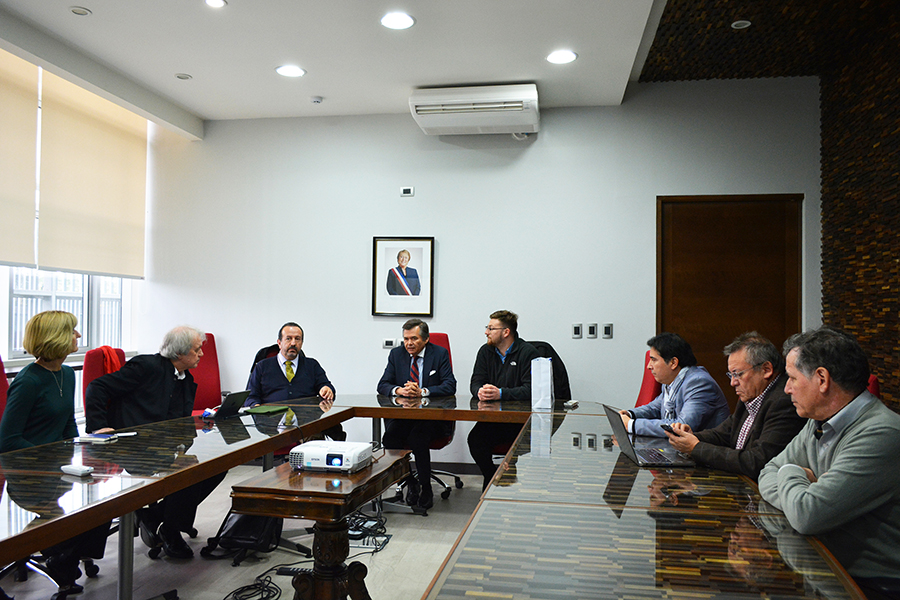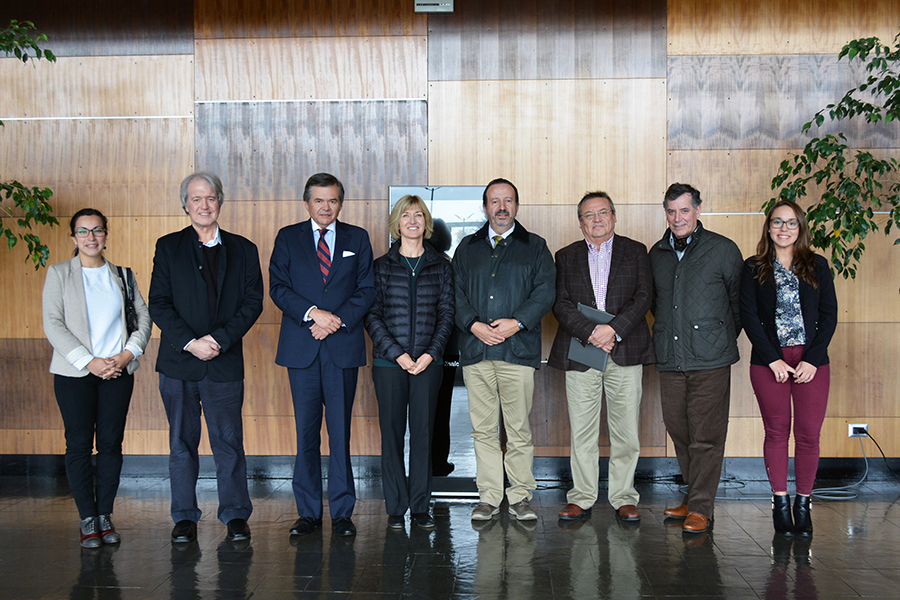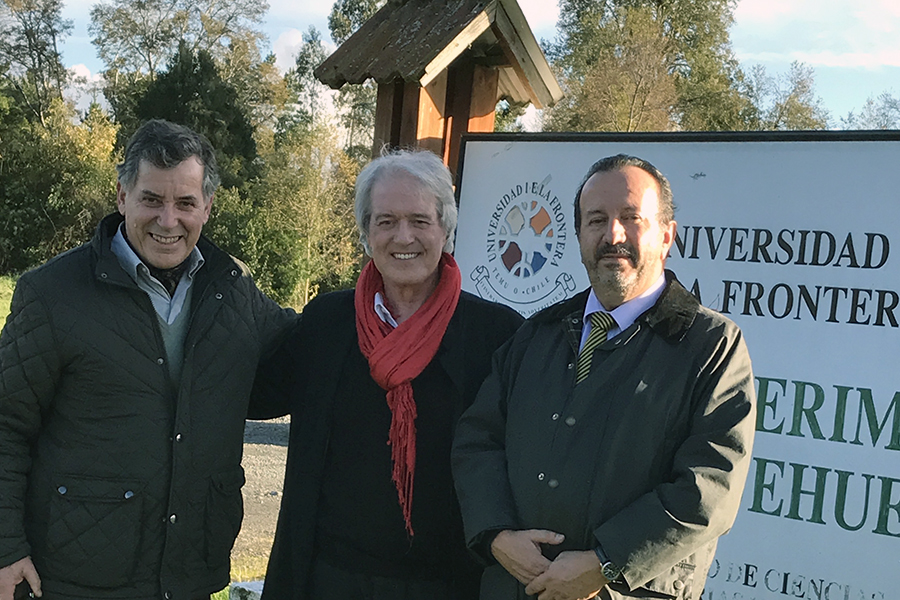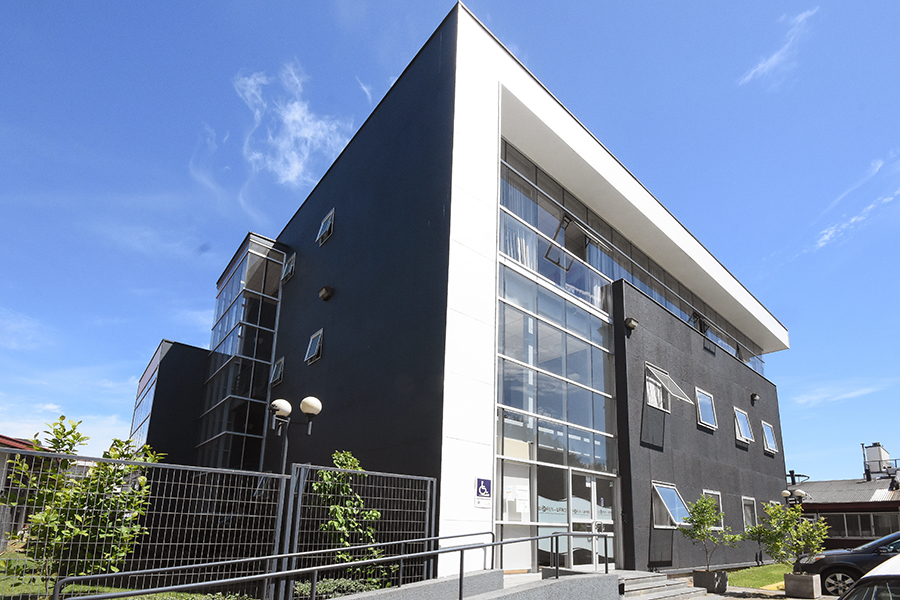|
As part of an invitation from the Faculty of Agricultural and Forestry Science, representatives of Western Australia came to the UFRO for a series of activities. |
The University of Werstern Australia is a university with tradition and wide prestige and is valued world-wide. Its representatives, the vice-rector and also dean of the Faculty of Sciences, Tony O'Donnell, and the director of International Relations, Annabele Turner, realized a visit to the Universidad de La Frontera, where they could experience the academic and scientific work that is promoted here. As part of an invitation from the Faculty of Agricultural and Forestry Science of the UFRO, the representatives of Western Australia carried out a series of activities, including a meeting with the authorities of the UFRO, led by the Rector Sergio Bravo, as well as a tour around the University facilities and a visit to the Maquehue Experimental Field. On this occasion, vice-rector O'Donnell talked with the authorities of the UFRO about the credentials of this prestigious university, especially the work of the Faculty of Sciences, which is among the 24 best in the world in the category of Life and Agricultural Sciences (according to the Academic and Ranking of World Universities 2016) and whose academic body includes the scientist Barry Marshall, Nobel Prize in Medicine and Physiology 2005 for his work on the bacterium Helicobacter pylori. The Rector Sergio Bravo explained to the Australian representatives the Chilean higher education standards and the relevant aspects of the UFRO as a public, state and regional university, reviewing the different areas of the academic and scientific work, emphasizing the institutional focus on internationalization through the search of strategic partnerships with foreign educational establishments. Vice-Rector O'Donnell explained that they are also working on internationalization at Western Australia, and that this is why they have been promoting collaborations, for example with Asian, and now Latin American institutions. "The reason why we are in Chile is that we are looking for long-term relationships, which will allow us to do student and professor exchange, and joint research", he said. In that sense, he added that as an Australian university they want to strengthen internationalization to also enable their teachers to work in different environments, considering that the research they carry out and the programs they have are aimed at tackling global issues.  Written By: Jassna Sepúlveda Beltrán Written By: Jassna Sepúlveda BeltránThis email address is being protected from spambots. You need JavaScript enabled to view it. |
|
One of the main objectives of the agreement was to increase the international visibility of doctorates associated with BIOREN-UFRO. The obtained results position the university as a leader at the national level. |
The Universidad de La Frontera provided relevant indicators in its last meeting with representatives of the Ministry of Education, sent to verify the latest advances in the Performance Agreement of Internationalization, which the institution executed between 2013 and 2017. Working for 4 years, the main actors of this agreement - the Scientific Bio Resource Nucleus, the Doctorate in Natural Resource Sciences and the Doctorate in Sciences with mention in Applied Cellular and Molecular Biology - reached the majority of the programmed goals, and today, the relationship that the UFRO has with its foreign peers is a reference at the national level. POSITIONED AT THE INTERNATIONAL LEVEL The strategies to increase joint scientific production with foreign researchers, partnerships to implement projects with national and international financing, increase the international visibility and the impact factor of the Journal Soil Science and Plant Nutrition -JSSPN-, strengthen the student mobility, English proficiency, co-tutorship and double graduation, are some of the keys that the UFRO made in front of Latin American and European universities. "We are training doctors for the world. And with this in mind, our students must know that it is important to speak English, to relate to foreign peers and to publish in quartile one journals. They have to know and understand that the requirements are very high and that, as a university, we are committed to excellence", said the director of the BIOREN-UFRO, Dr. Maria de la Luz Mora. At the same time, the international alliances with the most important university in Latin America (U. de Sao Paulo, Brazil) and European institutions (U. Federico II of Naples, Italy, U. Pierre Marie Curie, France, U. de Minho, Portugal) are a milestone in the implementation of the agreement. "We have reaffirmed the bases of internationalization. We are only one step away from a new double degree agreement with the U. of Leuven, Belgium. Our cooperation with Europe has been very dynamic", added the director of the Doctorate in Natural Resource Sciences, Dr. Francisco Matus. All this is also supported by the numbers that show that the goal was accomplished: 20 double degrees, 42 students in co-tutorship, 64 students with English proficiency certification, 38 research stays in English speaking countries: Australia, Canada, England, United States and New Zealand. At the same time, the large technological scientific platform BIOREN-UFRO - with the latest equipment - made it possible that publications achieve higher visibility, by using latest generation precision instruments for their investigations. MINISTERIAL POINT OF VIEW For the representatives of the Department of Institutional Financing of the Higher Education Division of the MINEDUC, Jaime Ormazábal, Paulina Enero and Irene Riffo, this visit revealed what it means to work as a team and have institutional support. "I think the most interesting of this visit is to see the trajectory of the projects with their different degrees of complications, but which show that, through strong coordination and institutional support, it is possible to carry out ambitious projects", said Paulina Enero, the analyst of the UFRO. Jaime Ormazábal - spokesperson of the head of the Department of Institutional Financing - said that there is always space for improvement and the university is ambitious in that and the institution never loses sight of its continuous improvement. "It drew my attention that there are no isolated proposals, there is always a team behind it and that is what is valued, because that is what brings sustainability in the future." Finally, Irene Riffo, an expert analyst, said that also for the MINEDUC, sustainability is the line to follow this year. "Lately, the University has demonstrated that the proposals, which have been financed by the Ministry, can have projection and there are substantial advances in relation to how they were initiated. The UFRO could be an example for other institutions, the financing is not for particular projects or just for doing anything, it is a serious job, and that allowed them to have a projection beyond the financing of the Ministry. According to the authorities of the UFRO, the university made the strategic decision to persevere in the complexity of its academic activity through partnerships and international cooperation. "We are betting where we have to bet and the idea is that it continues like this. It is a way to force ourselves and focus on where to invest efforts", said the director of Analysis and Institutional Development, Dr. Ricardo Herrera. INTERNATIONAL ACCREDITATION At the same time, the university is only one step away from the international accreditation. To achieve this, we would be the first university in the country to achieve this recognition. "We are in a formal process with the AQAS Agency, the best accrediting agency in Germany. We have a great possibility of accrediting our university in the European Community with its standards, which is a milestone in our work, opening possibilities for more and new projects", said Dr. Herrera.
 Written by: Lorena Espinoza Written by: Lorena EspinozaVice Rectorate of Research and Postgraduate Programs
|










